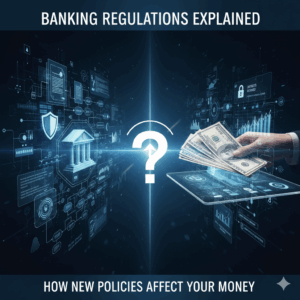Banking Regulations Explained: How New Policies Affect Your Money
AFFILIATE DISCLOSURE:
This article contains affiliate links. We may receive a commission for purchases made through these links, at no extra cost to you. We only recommend products and services we believe will genuinely help you achieve your financial goals.
Learn how 2024 banking regulations—from overdraft fees to open banking—affect your money and what you can do to adapt.
Introduction
Banking regulations are crucial in maintaining financial stability, ensuring consumer protection and promoting fair practices in the financial sector. However, frequent policy changes can leave consumers confused about how these rules impact their money.
This comprehensive guide will explain the latest banking regulations and their implications for your finances Here is a clearer version of the text:
“and offer practical insights to help you adapt to these changes.”
Why Banking Regulations Matter
Banking regulations are laws and guidelines government agencies impose to oversee financial institutions. These rules aim to:
- Protect consumers from unfair practices.
- Ensure financial stability by preventing bank failures.
- Promote transparency in banking operations.
- Combat fraud and money laundering.
Key regulatory bodies include:
- Federal Reserve (Fed) – Oversees monetary policy and bank stability.
- Federal Deposit Insurance Corporation (FDIC) – insures deposits and supervises banks.
- Consumer Financial Protection Bureau (CFPB) – Protects consumers from predatory financial practices.
- Office of the Comptroller of the Currency (OCC) – Regulates national banks.
Recent Changes in Banking Regulations
- Stricter Capital Requirements (Basel III Endgame)
The Basel III reforms, implemented globally, require banks to hold more capital to absorb losses during economic downturns. The U.S. Federal Reserve’s “Basel III Endgame” proposal further tightens these rules for large banks.
How It Affects You:
- Banks may offer lower interest rates on deposits to maintain higher capital reserves.
- Tighter lending standards could make obtaining loans (mortgages, personal loans) harder.
- Overdraft Fee Restrictions (CFPB Rules)
The Consumer Financial Protection Bureau (CFPB) has proposed capping overdraft fees at 3−3−14, down from the current average of $35 per transaction.
How It Affects You:
- Fewer surprise fees, saving consumers billions annually.
- Banks may increase other fees (monthly maintenance, ATM charges) to compensate.
- Open Banking & Data Sharing (CFPB’s Section 1033)
The CFPB’s Section 1033 rule promotes open banking, allowing consumers to share all of their financial data securely with third-party apps (e.g., budgeting tools lenders).
How It Affects You:
- More control over financial data.
- Better access to fintech services (e.g., personalized loan offers, automated savings).
- Stronger data privacy protections are required.
- Climate Risk Disclosures (SEC Rules)
The Securities and Exchange Commission (SEC) now requires large banks to disclose climate-related risks in their operations.
How It Affects You:
- Banks may adjust lending policies (e.g., fewer loans to fossil fuel projects).
- Potential higher costs for certain services as banks adapt.
- CBDCs & Digital Dollar Exploration
The Federal Reserve is researching a Central Bank Digital Currency (CBDC), a government-backed digital dollar.
How It Affects You:
- Faster, cheaper transactions if implemented.
- Privacy concerns over government tracking of spending.
How to Adapt to These Changes
- Shop Around for Better Banking Services
With banks adjusting fees and interest rates, compare options:
- High-yield savings accounts (e.g., Ally, Marcus by Goldman Sachs).
- Credit unions (often have lower fees).
- Monitor Your Credit & Loan Eligibility
If lending standards tighten:
- Improve your credit score (pay bills on time, reduce debt).
- Pre-approve loans before significant purchases.
- Use Fintech Tools for Better Money Management
With open banking, leverage apps like:
- Mint (budgeting).
- Credit Karma (credit monitoring).
- Stay Informed About Regulatory Updates
Follow:
- Federal Reserve announcements.
- CFPB consumer alerts.
FAQs: Banking Regulations & Your Money
- How do banking regulations protect my money?
Regulations ensure banks follow safe practices, provide deposit insurance (FDIC), and prevent fraud.
- Will new rules make loans harder to get?
Possibly—stricter capital requirements may lead to tighter lending standards.
- Are overdraft fees going away completely?
Not entirely, but the CFPB’s proposed caps will significantly reduce them.
- What is open banking?
A system allowing secure sharing of your financial data with approved third-party apps.
- How does climate risk affect my bank?
Banks may avoid risky loans (e.g., coastal real estate), impacting loan availability.
- What is a CBDC?
A digital dollar issued by the Federal Reserve, potentially replacing some cash transactions.
- Can regulations cause banks to raise fees?
Yes—Banks may increase other fees if they lose revenue from overdrafts.
- Should I switch banks due to new regulations?
Compare fees, interest rates, and services—some banks adapt better than others.
- How can I avoid being affected by tighter lending rules?
By maintaining a strong credit score and stable income.
- Where can I check for updates on banking laws?
Follow the FDIC, CFPB, and Federal Reserve websites.
Conclusion
Banking regulations constantly evolve, impacting everything from overdraft fees to loan accessibility. By staying informed and adapting your financial strategy, you can minimize disruptions and even benefit from new policies like open banking.
What banking changes have you noticed recently? Share your thoughts in the comments!
TheMoneyQuestion.org may earn a commission if you use affiliate links in this article (e.g., for banking products and credit monitoring services). We only recommend trusted providers that align with our readers’ financial goals. Read our full disclosure policy for details.

Leave a Reply